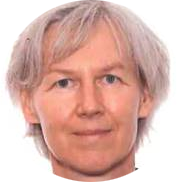Cambridge Healthtech Institute’s 8th Annual
Bioproduction: Scale, Bioreactors & Disposables
Making It Work
August 15-16, 2018
The 8th annual “Bioproduction” conference examines biologics production, including scale-down models, scaling up production, engineering bioreactors, single-use systems, and ensuring quality, within the context of increasing
productivity. A holistic review of bioprocessing will be explored, as well as practical details, such as monitoring and analyzing processes, and looking in-depth into how bioreactors process cells. The conference will address robust manufacturing
processes and next-generation technologies, while improving manufacturing platforms and ensuring product quality.
Final Agenda
Wednesday, August 15
7:00 am Registration Open and Morning Coffee (Grand Ballroom Foyer)
8:05 Chairperson’s Remarks
Thomas Villiger, PhD, Process Expert, Biopharmaceutical Operations, Novartis Pharma SAS
8:15 KEYNOTE PRESENTATION:
Next-Generation Biomanufacturing Processes and the Use of Integrated Advanced Process Control Tools
 Anne Tolstrup, PhD, Senior Consultant, Bioprocess Technology Consultants, Inc.
Anne Tolstrup, PhD, Senior Consultant, Bioprocess Technology Consultants, Inc.
The availability of biologics drugs keeps increasing with more and more patients being eligible for such therapeutics. To secure safe treatments and adequate drug supply for every patient the biomanufacturing community needs to continue optimization
of titers and yields while never compromising on quality. Advanced process control tools for on-line monitoring of controlled process parameters throughout production provides one increasingly employed way of achieving this goal.
9:00 Phase-Appropriate GMP for Biologicals Manufacturing – What Does It Mean and How Should It Be Interpreted?
 Trevor Deeks, PhD, QA/QC and GMP Consultant, Deeks Pharmaceutical Consulting Services, LLC
Trevor Deeks, PhD, QA/QC and GMP Consultant, Deeks Pharmaceutical Consulting Services, LLC
The author is the editor of a new book covering Phase Appropriate GMP for Biologicals Manufacturing. There are a huge variety of interpretations of what that means for different types of biological processes at different phases of development and
manufacturing from pre-clinical to commercial manufacture. This presentation summarizes the contributions from the many contributors to the book, which describes the current state-of-the-art and industry norms for GMP expectations in Biologicals
Manufacturing.
9:30 Application of Machine Learning for Prediction of Product Qualities to Facilitate Decision Making in Manufacturing Bioprocesses
 Wei-Chien Hung, PhD, MHS, Process Development Scientist I, Late Stage Upstream Development, Alexion Pharmaceuticals,
Inc.
Wei-Chien Hung, PhD, MHS, Process Development Scientist I, Late Stage Upstream Development, Alexion Pharmaceuticals,
Inc.
Product qualities such as total sialic acid (TSAC) and specific activities are important attributes (CQA) for a therapeutic protein. It has been demonstrated that many factors such as lot-to-lot variability of raw materials and operational variation
have potential effects on those product qualities at cell culture fluid (CCF) and harvested cell culture fluid (HCCF). Here we employed machine learning methods to establish a model based on the cell performance from 50 at-scale production bioreactors
to predict levels of product qualities. The error rate of prediction is able to be maintained below 10%, therefore becoming useful information for decision making in downstream parameters.
10:00 Coffee Break in the Exhibit Hall with Poster Viewing (Grand Ballroom)
10:45 Process Intensification: Current Approaches and Future Strategies
 Stefan R. Schmidt, PhD, MBA, Head, Operations (COO), BioAtrium AG
Stefan R. Schmidt, PhD, MBA, Head, Operations (COO), BioAtrium AG
Disposable equipment is now the industry standard, but the initial replacement of stainless steel instrument is surpassed by innovative strategies to intensify bioprocesses. This has led to the faster generation of cell lines, increased productivity
of bioreactors, combination and elimination of process steps in DSP, and finally hugely improved capacity utilization. This presentation gives an overview on current practice and an outlook to future developments.
11:15 NEW: Process Enhancement Through Optimized Fed-Batch Cultures
 Sharat Varma, MSc, Engineer II, Cell Culture Process Development, Genentech, Inc.
Sharat Varma, MSc, Engineer II, Cell Culture Process Development, Genentech, Inc.
11:45 High-Density Vero Cell Perfusion Culture in BioBLU 5p Single-Use Vessels
 Ankita Desai, Bioprocess Field Application Specialist, Eppendorf
Ankita Desai, Bioprocess Field Application Specialist, Eppendorf
Vero cells are anchorage-dependent cells widely used as a platform for viral vaccine production. In this study we cultivated Vero cells in our BioBLU 5p Single-Use Vessels pre-packed with Fibra-Cel and controlled with a BioFlo® 320. We achieved
the high Vero cell density of approximately 43 million cells per mL.
12:00 pm Multiplexing Raman Spectroscopy via Seg-Flow Automated Sampling of up to 8 Bioreactors
Paul Strand, Senior Application Engineer, Flownamics
12:15 Enjoy Lunch on Your Own
1:00 Session Break
1:45 Chairperson’s Remarks
Trevor Deeks, PhD, QA/QC and GMP Consultant, Deeks Pharmaceutical Consulting Services, LLC
1:50 FEATURED PRESENTATION:
Application of Computational Fluid Dynamics for Characterization of Parameters Impacting Scale-Up of Monoclonal Antibody Production Processes
 Michelle LaFond, Senior Director, Bioreactor Scale-Up and Development, Preclinical Manufacturing and
Process Development, Regeneron Pharmaceuticals, Inc.
Michelle LaFond, Senior Director, Bioreactor Scale-Up and Development, Preclinical Manufacturing and
Process Development, Regeneron Pharmaceuticals, Inc.
Use of both conventional and computational fluid dynamic (CFD) approaches to develop scale-down, pilot-scale models of production bioreactors have resulted in improved process understanding and data-driven transfers of late-stage processes that
take the “art” out of scale-up. Combining predictive scale-down models and CFD in our development studies has allowed us to fully characterize ranges of engineering parameters and bioreactor type. These studies yield results that
are more informative of how a process will perform at manufacturing scale and promote more robust scale-up. A case study of our approach to scale-up will be discussed.
2:20 Scale Up of Continuous Capture Chromatography
 Srinivas Chollangi, PhD, Senior Scientist, Process Development, Bristol-Myers Squibb Co.
Srinivas Chollangi, PhD, Senior Scientist, Process Development, Bristol-Myers Squibb Co.
Use of multi-column capture chromatography has been demonstrated to offer significant advantages over traditional batch chromatography in regards to improvement in productivity and capacity utilization of the resin. In our recent study, we have compared several multi-column formats (2-column, 4-column and 6-column) and the impact of process parameters such as resin type, feed titer, feed flow rates, % breakthrough and process duration on optimal performance during continuous capture. Upon identifying the optimal conditions, this presentation shows scalability of the process to a pilot-scale purification. Further, we have successfully developed a scale-down model to assess viral clearance across continuous capture chromatography. Insights will be shared on viral clearance across start-up, steady state and shut-down phases as well as effective cleaning strategies to prevent virus carry over between cyclic operations.
2:50 Productivity and Quality Control Optimization of a Large-Scale Multiproduct Biologic Facility
 Thomas Villiger, PhD, Process Expert, Biopharmaceutical Operations, Novartis Pharma SAS
Thomas Villiger, PhD, Process Expert, Biopharmaceutical Operations, Novartis Pharma SAS
The ever-growing product portfolio of biologics has boosted the demand of more manufacturing capacities worldwide. Given that new facilities involve very high capital expenditures and long times to construct and validate, it is of paramount
interest to use the existing manufacturing facilities at its maximum while ensuring product quality at all times. In this presentation, the concepts of different data driven optimizations regarding run rate improvement, productivity increase,
batch to batch reproducibility as well as product quality control will be presented.
3:20 MacroBac: New Technologies for Robust and Efficient Large-Scale Production of Recombinant Multiprotein Complexes
 Jill Fuss, PhD, Research Scientist, Molecular Biophysics and Integrated Bioimaging, Lawrence Berkeley National Laboratory
Jill Fuss, PhD, Research Scientist, Molecular Biophysics and Integrated Bioimaging, Lawrence Berkeley National Laboratory
MacroBac is a multigene baculovirus system that uses ligation-independent cloning for efficient cloning and assembly that is equally well-suited for either single or high-throughput cloning reactions. MacroBac vectors are polypromoter to minimize
gene order expression level effects seen in many polycistronic assemblies. Large assemblies are robustly achievable, and we have observed significant increases in expression levels and quality of large, multiprotein complexes over traditional
coinfection with multiple, single-gene baculoviruses.
3:50 Refreshment Break in the Exhibit Hall with Poster Viewing (Grand Ballroom)
4:45 Plenary Keynote Session (Constitution Ballroom)
 4:45 pm Chairperson’s Remarks
4:45 pm Chairperson’s Remarks
John Sterling, Editor in Chief, Genetic Engineering & Biotechnology News (GEN)
 4:50 Digital Transformation to Advance Next-Generation Biomanufacturing through
Data Integration and Analytics
4:50 Digital Transformation to Advance Next-Generation Biomanufacturing through
Data Integration and Analytics
Jerry Murry, PhD, Senior Vice President, Process Development, Amgen
Hundreds of millions of data points are currently generated through the development and execution of biopharmaceutical processes. It is expected that the volume and complexity of biomanufacturing data is set to grow exponentially as developers
and manufacturers integrate novel sensors, smart materials, process analytical technologies and process automation into laboratories and manufacturing plants. This presentation will describe the value associated with a comprehensive
digital strategy incorporating a structured data integration and analytics platform inclusive of AI, predictive modeling and visualization, and how digital transformation can advance next-generation biomanufacturing.
 5:20 Driving Change in Biomanufacturing through Innovation in Processes, Technologies and Operations
5:20 Driving Change in Biomanufacturing through Innovation in Processes, Technologies and Operations
Eliana Clark, PhD, Vice President, International Manufacturing Operations, Biogen
A critical step in meeting the demand of biologic production worldwide involves implementing disruptive manufacturing technologies, processes and capabilities. This talk will use Biogen’s new manufacturing site in Switzerland,
due to go online in 2019, as an example to demonstrate the new processes, operational models and technologies being adopted to drive value through innovation and deliver new medicines in areas such as Alzheimer’s.
 5:50 End-to-End Solutions Considering New Trends in Biomanufacturing
5:50 End-to-End Solutions Considering New Trends in Biomanufacturing
Guillaume Plane, MSc, MBA, Manager, Global Development, Biodevelopment Solutions, MilliporeSigma
The presentation will get into the current state of biomanufacturing, from DNA to market approval, considering the way a key supplier can support drug makers to the fullest, thanks to a deep understanding of the trends that could affect
our industry in the midterm, including growth of the pipelines, strengthening of regulations, and acceleration of timelines, for development as well as for the set-up of capabilities. Some thoughts and ideas will be proposed to
consider commercial manufacturing with single-use equipment.
6:25 Close of Plenary Keynote Session
6:25 10th Anniversary Champagne Celebration in the Exhibit Hall with Poster Viewing (Grand Ballroom)
7:30 End of Day
Thursday, August 16
8:00 am Registration Open and Morning Coffee (Grand Ballroom Foyer)
8:25 Chairperson’s Remarks
Srinivas Chollangi, PhD, Senior Scientist, Process Development, Bristol-Myers Squibb Co.
8:30 Characterization and Application of Ambr 250 Disposable Bioreactors in Upstream Process Development
 Ping Xu, PhD, Senior Scientist I, Biologics Development, Global Product Development & Supply, Bristol-Myers
Squibb Co.
Ping Xu, PhD, Senior Scientist I, Biologics Development, Global Product Development & Supply, Bristol-Myers
Squibb Co.
The disposable Advanced Microscale Bioreactors (Ambr 250) system has become a very useful and popular tool, due to the advantages of high throughput, automated control and short turnaround time. In this talk, we will present the
characterization of the Ambr 250 to define optimal operation conditions, as well as the assessment of the suitability of Ambr 250 for clone selection. The applications of Ambr 250 in early stage process development for rapid
advancement of innovative biologics to First-in-Human (FIH) clinical trials will be also introduced.
9:00 Bridging Clone Screening Platforms with Perfusion Bioreactors for Continuous Manufacturing
 David Busch, PhD, Senior Scientist, Pre-Clinical Development, Merck & Co., Inc.
David Busch, PhD, Senior Scientist, Pre-Clinical Development, Merck & Co., Inc.
Continuous manufacturing of mammalian biologics offers several potential advantages over batch methods of production. In an effort to optimize a continuous cell culture process, we developed clonal cell lines that were selected
for robust performance within a perfusion bioreactor platform. Following clone screening and evaluation using mock perfusion, we evaluated top performing clones in Ambr 15 bioreactors and 2L perfusion bioreactors to bridge
clone screening and batch production with a perfusion bioreactor process.
9:30 Latest Advancements in Production Process Intensification for Biopharmaceuticals
 Alfred Luitjens, Director, Cell Technology, Batavia Biosciences
Alfred Luitjens, Director, Cell Technology, Batavia Biosciences
Novel developments, like the use of fixed-bed bioreactors, allow for extreme process intensification. We are now able to build micro-facilities in which we can perform industrial production. This presentation will give an overview
and case study on highly intensified processing to reduce COGs, capital costs, and operating costs.
9:45 Enhancing Bioproduct Knowledge and Bioprocess Understanding with In-Line IR Spectroscopy and Particle Characterization Systems
Tyler Gable, PhD, Mettler Toledo AutoChem, Inc.
Direct, in-line monitoring of key process parameters in Upstream and Downstream bioprocess operations provide information necessary to monitor and control operations in an effective manner. For example, in situ FTIR spectroscopy
provides continuous analysis of bioprocess nutrients, metabolites and products while inline particle characterization and image analysis enables direct analysis of particles and aggregates in downstream processing stages.
In this presentation, we will provide an overview of the utility of insitu FTIR spectroscopy and inline particle characterization and morphology determination in Bioprocess Development and Biopharmaceutical Manufacturing
Stages.
10:00 Coffee Break in the Exhibit Hall with 2nd Session Poster Winner Announced (Grand Ballroom)
10:45 Application of Alternative Cell Separation Systems for the Harvest of Mammalian Cell Culture Processes in a Fully Disposable Single-Use Facility
 Dominique T. Monteil, PhD, Scientist II, Cell Culture, Process Science, Boehringer
Ingelheim Fremont, Inc.
Dominique T. Monteil, PhD, Scientist II, Cell Culture, Process Science, Boehringer
Ingelheim Fremont, Inc.
In a fully disposable facility where the use of continuous disk-stack centrifuges are not preferred, harvest processes based on conventional depth filtration become more challenging with increasing single-use bioreactor (SUB)
size and higher density culture. Here, several alternative single-use harvest technologies were evaluated. A disposable centrifuge and a range of different synthetic depth filters were tested. Results showed significant
improvement in filterability and reduction of depth filter area compared to full traditional depth filtration train.
11:15 Use of Disposable Materials in Bioproduction -- Small Changes May Have a Big Impact
 Yong Wang, PhD, Senior Director and Head, Process Industrialization, Process Development
& Technical Services, Shire, Inc.
Yong Wang, PhD, Senior Director and Head, Process Industrialization, Process Development
& Technical Services, Shire, Inc.
Single-use systems (SUS) have been widely adapted in biopharmaceutical manufacturing. While SUS offer significant advantages in production over conventional approaches, the polymeric nature of the SUS components poses concerns on chemical leaching into the process stream and the potential impact on product quality. A case study will be presented evaluating the root cause of increased aggregate levels observed in drug substance production and linking the higher aggregate levels with single-use disposable parts employed in downstream processing.
11:45 Equipment Characterization of a New Biologics Facility – Lessons Learned
 Jose Vallejos, PhD, Manufacturing Scientist, MS&T, AstraZeneca
Jose Vallejos, PhD, Manufacturing Scientist, MS&T, AstraZeneca
Equipment characterization of new biologics facilities is key to mitigate tech transfer risks. Mass transfer and mixing time studies along with PID tuning of dissolved oxygen and temperature control loops can be time consuming.
Poorly planned and executed equipment characterization studies can cause costly delays in a new facility commissioning and start-up of GMP runs. This presentation covers mass transfer studies in rocker bags and stirred
stainless-steel bioreactors as well as mixing time studies and PID control tuning (Dissolved Oxygen and Temperature).
12:15 pm Enjoy Lunch on Your Own
1:15 10th Anniversary Cake Break in the Exhibit Hall with Last Chance for Poster Viewing (Grand Ballroom)
1:55 End of Conference